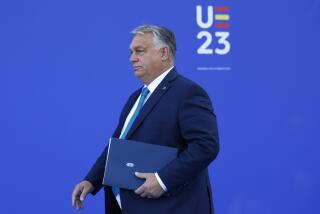‘68 Lesson a Hard One, Gorbachev Tells Czechs
- Share via
BRATISLAVA, Czechoslovakia — Soviet leader Mikhail S. Gorbachev said Saturday that Czechoslovakia and the Soviet Union learned a hard lesson from the events of 1968, when Warsaw Pact troops ousted a reform-minded regime whose policies were much like those he is now trying to introduce in the Soviet Union.
The Kremlin chief spoke before cutting short his official visit to Czechoslovakia, which began three days later than expected because Gorbachev was reported to have been suffering from a cold.
Instead of going home this morning as planned, he returned to Moscow late Saturday afternoon to prepare for the visit there this week of Secretary of State George P. Shultz.
Shultz Due Monday
The American official is due in the Soviet capital Monday for talks expected to include the progress of the Geneva negotiations on limiting intermediate-range nuclear forces and a possible new agreement on nuclear weapons testing.
Although Gorbachev’s remarks here were brief and enigmatic, it was clear that he had the memory of the “Prague Spring” reform movement on his mind during his three-day official visit to Czechoslovakia.
On arrival in the country’s No. 2 city, Gorbachev said he first visited Bratislava in 1969, “in a period which was not easy.”
“We experienced, together with you, a difficult period, but we went through it with dignity, with honesty, and we thought about what happened,” he said. “We thought things over honestly, and we passed through a hard school.”
Headed by Brezhnev
The Kremlin, headed at the time by Leonid I. Brezhnev, said in 1968 that its troops went into Czechoslovakia to put down “counterrevolutionary tendencies” that emerged under Alexander Dubcek, then-leader of the Czechoslovak Communist Party. Previously there had been no Soviet troops stationed in Czechoslovakia. The Soviet garrison is now estimated to number 80,000 to 85,000.
Dubcek had introduced changes that included greater democratization, an end to censorship and more autonomy from Communist Party control for the courts, trade unions, government ministries and business enterprises.
“They (Soviet troops) are no longer here to quell pluralism or political manifestations,” a Western diplomat said. “They’re here because they serve a strategic purpose for the Soviet Union.”
Gorbachev did not mention Dubcek, who now lives in quiet retirement in Bratislava, but in a speech to Communist Party members Friday, he said that the experience of various East Bloc countries now shows that “no party has a monopoly on truth.”
Improved Ties Urged
Although he urged greater economic links among the Soviet Union and its allies, he spoke favorably of “the independence of each party, its responsibility toward its people, its sovereign right to solve the questions of the development of the country.”
But he also said his efforts to introduce reforms summed up by the slogans of democratization, economic restructuring and glasnost, or openness, in the Soviet Union amount to “the essence of socialism.” At the same time, he praised the Czechoslovak leadership, headed by Gustav Husak as president and Communist Party chief, for endorsing his policies of economic and political change.
Husak, now 74, came into power after Dubcek’s ouster and has been identified for most of the period since then with a reversal of the reforms that had become known as “socialism with a human face.” Now, however, with the country’s growth rate stagnating, Husak has endorsed Gorbachev’s economic reforms, at least in words.
Government officials in Prague have acknowledged that Czechoslovakia has yet to come up with the actual plans for restructuring its economy, but they said they expected the restructuring to go into effect by 1990.
“The Communist Party of Czechoslovakia has expressed full support for, and solidarity with, the innovative course taken by the Communist Party of the Soviet Union,” Husak said in welcoming Gorbachev to Czechoslovakia for his first official visit since taking office two years ago.
On Saturday, residents of Bratislava pressed against crowd barriers to welcome the Soviet leader to their city, where he met with leaders of the Slovak Republic, one of the two republics that make up Czechoslovakia.
Gorbachev and Husak also visited an agricultural cooperative, where they toured an outdoor exhibit of farm machinery.
More to Read
Sign up for Essential California
The most important California stories and recommendations in your inbox every morning.
You may occasionally receive promotional content from the Los Angeles Times.













